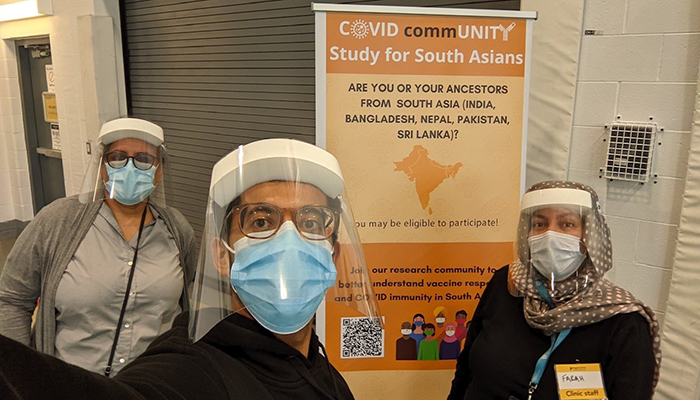McMaster-led study investigating COVID-19 immune response in South Asian communities

McMaster researchers are leading a pan-Canadian study investigating the immune response to the COVID-19 vaccine within the South Asian community.
Approximately $1.5 million is being invested in this study, which will seek to understand vaccine confidence and hesitancy in this population that has been disproportionately affected by COVID-19. The study is supported by the Government of Canada through its COVID-19 Immunity Task Force and Vaccine Surveillance Reference Group.
Canada’s South Asian communities are the fastest growing ethnic group in Canada and are among the highest at-risk populations for illness from COVID-19. South Asians have a five to 10-fold higher risk of SARS-CoV-2 infection, and a 1.5 to two-fold higher mortality risk after SARS-CoV-2 infection, compared to white Canadians.
The study of 3,000 South Asians in the Greater Toronto Area (GTA) in Ontario and the Greater Vancouver Area (GVA) in British Columbia (B.C.) will seek to understand if these ethnic differences can be explained by unique socio-cultural factors, such as multigenerational households, occupational factors such as doing essential work, and biological factors such as pathophysiological differences in susceptibility or response to infection and vaccination.
Participants in the study—called COVID CommUNITY-South Asian—will also include those from earlier studies in the GTA and GVA led by the Population Health Research Institute (PHRI) of McMaster University and Hamilton Health Sciences.
“Our study is a prospective cohort study—meaning we enroll participants at the community vaccination clinics being held in South Asian ‘hot spots’ such as Brampton, and the rest of the GTA, and follow them forward in time to collect contextual information including their living and work conditions, clinical and health care access information,” said Sonia Anand, principal investigator of the study.
Anand is a professor of medicine at McMaster, vascular medicine physician at Hamilton Health Sciences, a senior scientist at PHRI, and director of the Chanchlani Research Centre at McMaster.
“This is a more targeted approach to conducting a study, rather than ‘after the fact’ approaches, such as inferring ethnicity by last name or by postal code in participant data,” she said.
Scott Lear, lead principal investigator in B.C., added: “South Asian communities across Canada have been hit hard by the pandemic and it’s vital that they understand the safety and effectiveness of vaccines. This study will also help us understand why some people may be hesitant about being vaccinated.”
Lear is also a professor in the Faculty of Health Sciences at Simon Fraser University.
“It is critical that we increase vaccine uptake for all Canadians, but we know that the South Asian community will need specific attention and targeted outreach, particularly given the disproportionate impacts of COVID-19 on this ethnocultural community,” said Lawrence Loh, co-investigator and Medical Officer of Health, Peel Region, Ontario.
“This study will allow us to understand where there is hesitancy, use the science to demonstrate the safety and efficacy of Health Canada approved COVID-19 vaccines, and lead to more people within the South Asian community making the choice to accept this life-saving vaccine.”
“It is imperative that we study the immune response to vaccines not only in the general population, but in priority populations, such as the South Asian community,” says Scott Halperin, co-chair of the Vaccine Surveillance Reference Group and principal investigator of the Canadian Research Immunization Network. “We need to ensure that the level of antibodies achieved is comparable across various populations.”
The COVIDCommUNITY-South Asian study involves an interdisciplinary team of experts and strong collaborations with public health and South Asian community organizations. Along with Sonia Anand and Scott Lear, co-investigators include McMaster University’s Dawn Bowdish (immunology), Russell de Souza (epidemiology), Mark Loeb (infectious diseases), Sujane Kandasamy (qualitative research), Gita Wahi (pediatrics), Rahul Chanchlani (health services research) and Zubin Punthakee (epidemiology). The team also includes Shrikant Bangdiwala, Senior Scientist and Director, Statistics, PHRI, and Shelly Bolotin (sero-epidemiology) from Public Health Ontario and the University of Toronto.
Funding
